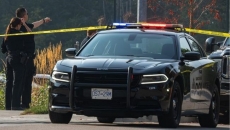Arti and Anton are the newest floppy-eared members of a team of dog detectives trained to sniff out a dangerous bacterium in British Columbia hospitals, where it can easily spread among vulnerable patients.
The two-year-old springer spaniels recently graduated from training and have joined Fancy, Traveller and Angus at the Canines for Care scent detection program aimed at reducing the rates of C. difficile in Vancouver and beyond.
Teresa Zurberg, who runs the program for Vancouver Coastal Health, said the hunting breed of pooches can smell the slightest presence of C. difficile on surfaces and equipment, long before it comes across as "overboiled broccoli" to human noses in the presence of infected patients soiled with diarrhea.
Health Canada says C. difficile is the most frequent cause of infectious diarrhea in hospitals and long-term care homes in many industrialized countries, including Canada.
The potentially deadly bacterium is found in feces. People can become infected when they touch contaminated surfaces and then their mouth. C. difficile can spread if a sick person has not washed their hands or when health-care workers don't regularly change their gloves.
Those at highest risk include the elderly and people with severe underlying conditions who are taking certain antibiotics, which over a long period can destroy the gut's normal bacteria and cause C. difficile to take over and produce toxins. That damages the bowel and leads to diarrhea. In some cases, C. difficile can cause life-threatening bowel perforation or sepsis.
Zurberg said one canine with a handler regularly screens units for C. difficile at Vancouver General Hospital and covers the whole facility in a month while screenings at four other hospitals in the region are done every six to eight weeks.
She said about 10 per cent of dogs from a large pool of candidates typically end up on the short list to be considered for up to eight months of training but only a couple of pooches may make the final cut for a job that requires the right temperament.
Two weeks ago, 12-week-old cocker spaniels Disco and Kip became the latest to try out for a chance to become certified C. difficile detectors.
Their goal, if they graduate from the program, will be to hunt for the C. difficile odour by sweeping a unit in about 15 minutes, Zurberg said. A reward — either a toy or a treat such as a cookie or dehydrated meat -- is the big motivator.
She said there's no quicker way to find C. difficile on equipment or elsewhere in a hospital environment than letting the four-legged detectives do their work, and it would otherwise take days to swab for the bacterium and grow it in a lab.
"C. diff is a bit of a diva bacteria. It's hard to grow and it's hard to kill."
The former medic in the Canadian Armed Forces had C. difficile herself in 2013 following a leg infection for which she took antibiotics. She got sepsis and still has health issues from the so-called superbug.
"I lost 20 pounds in a week. It was horrible."
That experience fuelled Zurberg's passion to help reduce C. difficile in hospitals.
So far, the Vancouver General-based dog teams she started leading seven years ago, with now nine-year-old pooch Angus as the first recruit, have worked at 29 of British Columbia's hospitals. The canines ventured to three Ottawa hospitals in 2019, but the pandemic halted any potential expansion of the program.
Authors of an observational paper published that year in the Canadian Journal of Infection Control assessed the program as successful based on 18 months of data from Vancouver General. They include Zurberg, a microbiologist and epidemiologists from Vancouver Coastal Health as well as a researcher from the University of British Columbia's faculty of medicine.
Their findings showed 56 per cent of C. difficile cases were detected in the hospital's hallways, suggesting such areas should be decluttered so they can be better cleaned.
The paper also said 18 per cent of the detections were on hallway carts and items on them. The carts typically carry medication, dressings for wounds and personal protective equipment including gowns for staff.
The dogs also sniffed out C. difficile in staff lounges and lockers, on items near patients' beds and in public washrooms.
Dr. Marthe Charles, who heads the division of medical microbiology and infection prevention and control at Vancouver Coastal, said just seeing the dogs on wards helps staff and patients remember to wash their hands.
The push to reduce infections also includes use of the right antibiotics for the right amount of time as well as better cleaning to specifically target C. difficile, she said.
"We clean the areas and then we go with the dog and see if there's any reservoir that we might have missed or areas that are still harbouring some C. difficile. So, once the dog identifies that area, we clean it up.
"C. difficile has the ability of surviving on surfaces because it protects itself in little spores," said Charles, adding that multiple studies have shown the spores can live for days or even months.
"The dogs really help us visualize what are the areas of concern that we have to pay attention to that might be part of a chain of transmission."
Charles said one of Canada's most notable outbreaks of C. difficile occurred across 30 hospitals in Quebec nearly 20 years ago, when infection rates jumped five times.






